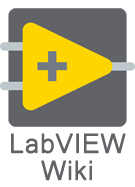Help:Link: Difference between revisions
m Help:Links moved to Help:Link |
No edit summary |
||
| Line 70: | Line 70: | ||
Sometimes it is necessary to refer to a section of a page when linking, rather than the whole page. You can create a link to any subheading on any page in LabVIEW Wiki by including a # followed by the subheading at the end of a link. For example: [[Help:Links# How to link]]. In all section links, be sure to use a piped link for readability. Using a piped link, the previous example looks like this: [[Help:Links# How to link|How to Link]]. If a section title changes, rather than go red/inactive, the link will lead to the top of the linked page. Keep in mind that redirects do not follow section links, making it useless to include them there. | Sometimes it is necessary to refer to a section of a page when linking, rather than the whole page. You can create a link to any subheading on any page in LabVIEW Wiki by including a # followed by the subheading at the end of a link. For example: [[Help:Links# How to link]]. In all section links, be sure to use a piped link for readability. Using a piped link, the previous example looks like this: [[Help:Links# How to link|How to Link]]. If a section title changes, rather than go red/inactive, the link will lead to the top of the linked page. Keep in mind that redirects do not follow section links, making it useless to include them there. | ||
[[Category:Help]] | ==See also== | ||
[[Help:Piped link|Piped link]] | |||
[[Category:Help|Link]] | |||
Revision as of 07:50, 26 September 2007
There are two sorts of links in the LabVIEW Wiki:
- internal links to other pages in the wiki
- external links to websites
To add an internal link, enclose the name of the page you want to link to in double square brackets. When you save the page, you'll see the new link pointing to your page. If the page exists already, it is displayed in black, empty pages are displayed in red. Selflinks to the current page are not transformed in URLs but displayed in bold.
The first letter of the target page is automatically capitalized and spaces are represented as underscores (typing an underscore in the link will have a similar effect as typing a space, but is not recommended, since the underscore will also be shown in the text).
How to link
| Description | You type | You get |
| Internal link | [[Main Page]] | Main Page |
| Piped link | [[Main Page|different text]] | different text |
| Anchor link (Section Link) | [[#External links|Anchor link]] | Anchor link |
| External link | http://mediawiki.org | http://mediawiki.org |
| External link, different title |
[http://mediawiki.org MediaWiki] | MediaWiki |
| External link, unnamed |
[http://mediawiki.org] | [1] |
| External link, same host unnamed |
[http://{{SERVERNAME}}/pagename] | [2] |
| Interwiki link | [[Wikipedia:MediaWiki]] | Wikipedia:MediaWiki |
| mailto | mailto:info@example.org | mailto:info@example.org |
| mailto unnamed | [mailto:info@example.org] | [3] |
| mailto named | [mailto:info@example.org info] | info |
| redirect | #REDIRECT [[Main Page]] | → Main Page |
Linking to a section
Sometimes it is necessary to refer to a section of a page when linking, rather than the whole page. You can create a link to any subheading on any page in LabVIEW Wiki by including a # followed by the subheading at the end of a link. For example: Help:Links# How to link. In all section links, be sure to use a piped link for readability. Using a piped link, the previous example looks like this: How to Link. If a section title changes, rather than go red/inactive, the link will lead to the top of the linked page. Keep in mind that redirects do not follow section links, making it useless to include them there.
